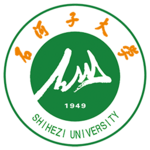Shihezi University (SHZU) is a public university in Shihezi, Xinjiang, China. Founded in 1996, it is affiliated with the Xinjiang Production and Construction Corps, and co-funded by the Ministry of Education and the Corps. The university is part of Project 211 and the Double First-Class Construction.[1][2]
石河子大学 | |
 | |
| Type | Public |
|---|---|
| Established | 1996 |
| Affiliation | Xinjiang Production and Construction Corps |
Academic affiliation | Double First-Class Construction Project 211 |
Academic staff | 2,600 (April 2022) |
| Undergraduates | 41,000 (April 2022) |
| Postgraduates | 6,482 (April 2022) |
| Location | , , China 44°18′24″N 86°03′16″E / 44.30667°N 86.05444°E |
| Campus | Urban, 180.2 ha (445 acres) |
| Website | www |
| Shihezi University | |||||||||
|---|---|---|---|---|---|---|---|---|---|
| Chinese name | |||||||||
| Simplified Chinese | 石河子大学 | ||||||||
| Traditional Chinese | 石河子大學 | ||||||||
| |||||||||
| Uyghur name | |||||||||
| Uyghur | شىخەنزە ئۇنىۋېرسىتېتى | ||||||||
| |||||||||
History
editShihezi University was officially formed in September 1996 with the merge of Shihezi Medical College (est. 1949), Shihezi Agricultural College (est. 1959), XPCC Vocational College of Economics (est. 1959), and XPCC Vocational College of Education (est. 1960).[1][3][4]
Academics
editShihezi University offers 10 specialties—Agriculture, Medicine, Engineering, Economics and Trade, Management, Literature and Arts, Sciences, Education, Law, and History. It has 23 colleges, offering 10 doctorate degrees, 60 master's degrees, 97 bachelor's degrees, 1 pre-university senior middle school program, five specialties that enroll on-job-teachers for master's degrees, two post-doctoral scientific work stations, four post-doctoral mobile stations.[5] The university has jointly set up graduate education bases with Peking University and Tianjin University, as well as a program for culture-oriented quality education.
The university has 11 disciplines: Ministry of Agriculture, Xinjiang Uygur Autonomous Region (XUAR) and the Xinjiang Production and Construction Corps (XPCC), three key laboratories co-constructed and supported by the Ministry of Education, the Ministry of Science and Technology, and the XPCC. It has two key laboratories of XPCC, two key bases for art and scientific research, and 24 graduate schools and research centers. The university has become a key scientific research base of XPCC and XUAR.
Rankings and reputation
editThe Best Chinese Universities Ranking, also known as the "Shanghai Ranking", placed the university 138th in China and the 2nd best university in Xinjiang after Xinjiang University.[6]
It was ranked 901-1000th globally by the Academic Ranking of World Universities (ARWU).[7]
| Ranking lists | Years | National | Asia | Global |
|---|---|---|---|---|
| Wu shulian Rankings | 2022 | 162[8] | ||
| CUAA Rankings | 2022 | 167[9] | ||
| ARWU | 2023 | 138[6] | 901-1000[10] | |
| CWUR | 2023 | 216[11] | 1385[11] | |
| SCImago Institutions Rankings | 2022 | 157[12] | 322[12] | 623[12] |
| CWTS Leiden Ranking | 2023 | 185 | 343 | 839[13] |
| USNWR | 2022-2023 | 293[14] | 755[14] | 1880[14] |
Faculty and students
editThe university has 2,600 staff. There are 1,894 full-time teachers including two academicians of the Chinese Academy of Engineering, 355 professors, 706 associate professors, 58 experts and scholars receiving outstanding achievement awards at national and provincial level, and 81 distinguished experts and scholars receiving special subsidies from the government.[5] It employs more than 10 foreign experts and teachers every year.
Students come from 31 provinces and regions. The student population is currently 41,000, including 22,462 undergraduates, 6482 postgraduates and 415 international students from countries such as the United States, India, Russia, Pakistan, Bangladesh, Kazakhstan, Afghanistan, etc.[5]
Campus
editThe campus covers 1,802,000 square meters. It has 1,214,000 square meters of building, and the area of its laboratories is 184,100 square meters.[5] The library has a collection of 3,000,000 Chinese and foreign books and periodicals, and is only one model project in Xinjiang, as university digital libraries in State High-tech Project 863. It has a book collection spot of the UN's Food and Agriculture Organization (FAO).[15]
Location
editThe university is located in Shihezi, the Garden City, by the river of Manas on the northern foot of the Tianshan Mountains in Xinjiang.
References
edit- ^ a b "学校概况". www.shzu.edu.cn. Retrieved December 13, 2021.
- ^ 新疆生产建设兵团的体制与运行研究. 21世纪中国民族问题丛书 (in Chinese). 社会科学文献出版社. 2017. p. 93. ISBN 978-7-5097-8988-9. Retrieved January 7, 2025.
- ^ 新疆生产建设兵团统计年鉴 (in Chinese). 中国统计出版社. 2008. ISBN 978-7-5037-5409-8. Retrieved December 24, 2024.
- ^ 新疆维吾尔自治区地方志编纂委员会 (2008). 新疆年鉴 (in Chinese). 新疆人民出版社. Retrieved December 24, 2024.
- ^ a b c d "学校概况". 石河子大学 (in Chinese). Archived from the original on September 7, 2022. Retrieved September 7, 2022.
- ^ a b "ShanghaiRanking's Best Chinese Universities Ranking". www.shanghairanking.com. Retrieved August 16, 2023.
- ^ "ShanghaiRanking-Shihezi University". www.shanghairanking.com. Retrieved August 16, 2023.
- ^ "武书连2022中国大学排行榜公布 清华北大浙大前三". 搜狐网 (in Chinese). March 30, 2022. Retrieved September 7, 2022.
- ^ "2022校友会中国大学排名公布, 北京大学十五连冠". 艾瑞深网 (in Chinese). May 14, 2022.
- ^ "ShanghaiRanking-Univiersities". www.shanghairanking.com. Retrieved August 16, 2023.
- ^ a b "World University Rankings 2023 | Global 2000 List | CWUR". cwur.org. Retrieved August 16, 2023.
- ^ a b c "University Rankings - China 2022". www.scimagoir.com. Retrieved September 7, 2022.
- ^ Studies (CWTS), Centre for Science and Technology. "CWTS Leiden Ranking". CWTS Leiden Ranking. Retrieved August 16, 2023.
- ^ a b c "Shihezi University Rankings". USNews. October 26, 2022. Retrieved October 28, 2022.
- ^ "本馆概况". 石河子大学图书馆 (in Chinese). September 21, 2021. Archived from the original on September 7, 2022. Retrieved September 7, 2022.
- Shihezi University (Official site for International Students)
Further reading
edit- McGregor, Richard. The Party: The Secret World of China's Communist Rulers. Harper Perennial: New York, 2012. ISBN 978-0-06-170876-3. Originally published in 2010 by Allen Lane, a Penguin Books imprint.
External links
edit- Official website (in Chinese)